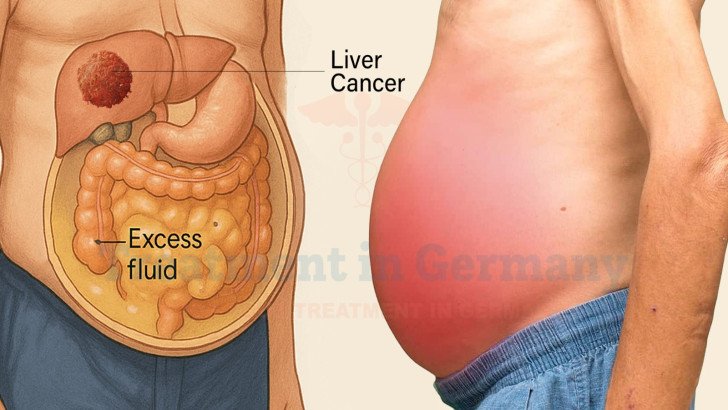
Learn how ascites develops in liver cancer and other abdominal cancers, and why German healthcare centers are trusted by international patients in Germany.
Ascites, or fluid buildup in the abdomen, is a frequent complication seen in liver cancer and other abdominal malignancies. It not only causes physical discomfort but also signals disease progression. Managing ascites effectively can greatly improve a patient’s comfort and overall quality of life. For international patients, German healthcare centers are trusted for their precise diagnosis, advanced treatments, and world-class support in Germany
Ascites occurs when excess fluid collects in the abdominal cavity, surrounding the internal organs. In a healthy body, this space contains only a small amount of lubricating fluid. However, in cancer patients, fluid builds up due to factors such as:
This condition is common in liver cancer, ovarian cancer, pancreatic cancer, and stomach cancer, making ascites a key indicator of advanced abdominal disease.
While liver cancer is the leading cause, several other cancers can lead to ascites, including:
Each type requires a personalized treatment approach, which is why German healthcare centers design care plans based on both cancer type and stage.
Signs and Symptoms of Ascites
The symptoms of cancer-related ascites often develop gradually. Common signs include:
These symptoms often prompt patients to seek medical help. In Germany, specialists use advanced imaging to identify even small amounts of fluid early for accurate diagnosis.
How Doctors Diagnose Ascites in Germany
At German healthcare centers, diagnosing ascites involves a thorough and precise process. Doctors use a combination of imaging tests and laboratory analysis to find the cause and extent of fluid buildup.
Diagnostic Methods Include:
This complete approach helps distinguish between malignant and non-malignant ascites and ensures accurate treatment planning.
Treatment Options for Cancer-Related Ascites
Managing ascites involves relieving symptoms and treating the underlying cancer. In Germany, doctors use the latest medical and interventional methods.
1. Medications and Diet
2. Procedures to Remove Fluid
3. Cancer Treatments
To address the root cause of ascites, German specialists offer:
Each treatment is customized by a multidisciplinary team, ensuring that every international patient receives a comprehensive care plan.
Supportive Care for managing Ascites in Germany
Managing ascites also involves maintaining comfort and emotional well-being. German healthcare centers focus on holistic care, including:
This supportive system helps patients feel cared for at every stage, making Germany a preferred destination for medical tourism in oncology.
Long-Term Care and Patient Outcomes
Although ascites often indicates advanced cancer, proper management can extend life expectancy and enhance comfort. In Germany, innovative treatments and advanced diagnostic tools improve symptom control and quality of life.
Patients treated at German healthcare centers report better mobility, reduced pain, and renewed hope through personalized care programs. The focus is always on providing patients with the best possible outcome, physically, emotionally, and mentally.
🌍Why Patients Worldwide Prefer Our Medical Services in Germany – Key Benefits Explained:
Frequently Asked Questions (FAQs)
What causes ascites in liver cancer?
It happens when tumors block liver blood flow, causing pressure and fluid buildup in the abdomen.
How is ascites diagnosed in Germany?
Doctors use ultrasound, CT, MRI, and fluid tests for precise evaluation.
Is ascites treatable in advanced cancer?
Yes, in Germany, it can be managed with medications, paracentesis, and cancer therapy.
What is paracentesis?
A safe and quick procedure to drain abdominal fluid, easing pressure and discomfort.
Can ascites come back after treatment?
It can recur, but ongoing care and therapies help control it effectively.
Can ascites disappear completely?
While full recovery is rare, treatments in Germany can significantly reduce recurrence and improve comfort.
How is malignant ascites different from other types?
Malignant ascites contains cancer cells and usually indicates advanced-stage abdominal or liver cancer.
What foods should patients avoid with ascites?
Limit salt, processed food, and alcohol to prevent water retention.
What is the long-term outcome for patients with ascites?
With advanced care in Germany, patients experience better symptom control, comfort, and improved quality of life.
Do international patients have access to these services?
Yes. TIG (Treatment in Germany) at www.treatmentingermany.de helps international patients with complete logistical arrangements.
Kindly complete the form below, and our dedicated team will reach out to you promptly. We look forward to connecting with you soon!
Trierer Straße, 56072 Koblenz, Germany

.webp)
 (1).webp)

.webp)
 (1).webp)


.webp)
 (1).webp)

.webp)
 (1).webp)
